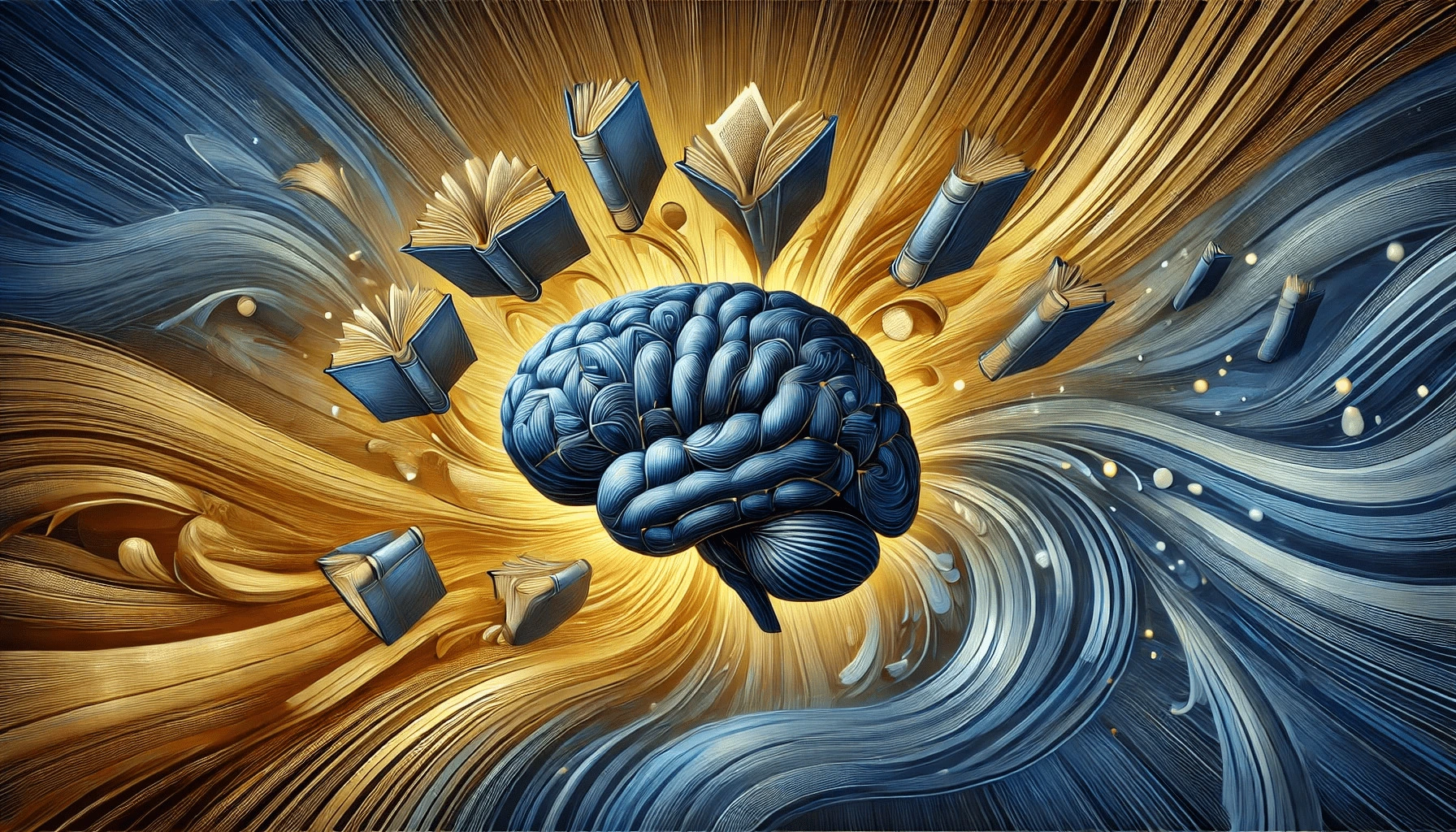For some time now, I’ve noticed a growing wave of digital influencers focused on the literary niche. Typically, the books they recommend are popular, easily digestible works that lack deep content—what some call “fast-food” literature. But is reading these books alone enough? Is reading any book truly better than reading none? To answer these questions, we turn to a field of study that is gaining relevance every day: neuroscience.
General Benefits of Reading
Virtually any type of reading is sufficient to activate brain regions related to language, memory, and imagination. This process strengthens neural connections and promotes the mechanism that allows the brain to “self-modify,” known as neuroplasticity (Izquierdo, 2006).
Additionally, a 2018 study by Kourkouta & Vakalopoulou demonstrated that reading significantly reduces levels of cortisol, the stress hormone. Other benefits include vocabulary expansion (Huettig & Pickering, 2019) and improved sleep quality—especially when reading physical books, in contrast to the melatonin-suppressing blue light emitted by digital devices (Chang et al., 2015).
The Role of Entertainment Reading (“Fast-Food” Books)
Popular fiction and entertainment books serve a specific neurological function: they activate the Default Mode Network (DMN). This network is often associated with the mental simulation of experiences and the enhancement of empathy. fMRI studies show that reading imaginative narratives increases activity in the medial prefrontal cortex, a region linked to generating alternative scenarios and creativity (Mar et al., 2006).
Moreover, reading lighter narratives tends to reduce activity in the amygdala—a structure fundamental to emotional regulation—promoting measurable mental relaxation (Erk et al., 2010).
Complexity and Critical Thinking
When we engage with complex texts, such as classic literature or philosophical works, the cognitive demand shifts. These readings require robust integration between the dorsolateral prefrontal cortex (responsible for analysis) and the inferior frontal gyrus (involved in semantic processing). This intense activity enhances critical thinking and reflective capacity (Kidd & Castano, 2013).
Philosophical texts, specifically, promote the formation of chunks in working memory, forcing the brain to reorganize complex information into meaningful blocks, a vital exercise for higher cognition (Baddeley & Hitch, 1974).
Neurological Distinctions by Genre
Neuroscience points to clear distinctions in how different types of text are processed:
- Literary Fiction: Activates the superior temporal sulcus, crucial for social inferences and Theory of Mind (Mar et al., 2006).
- Non-Fiction: Strengthens the left angular gyrus, associated with the integration of factual information and technical learning (Gabriel et al., 2016).
- Digital/Rapid Reading: Tends to reduce activation of the ventral temporal cortex, essential for deep comprehension (Wolf, 2018).
In contrast, the “slow reading” of classics increases cortical thickness in the occipito-temporal cortex, refining linguistic processing (Dehaene, 2009).
Cognitive Reserve and Longevity
Avid readers develop a structural advantage: up to 15% more connections in the white matter, creating a “cognitive reserve” that protects the brain against aging (Shafto et al., 2014). Longitudinal studies, such as Wilson et al. (2013), show that elderly people who read weekly have a 32% lower risk of developing dementia.
More recently, a study published in Nature Mental Health (Bartrés-Faz et al., 2024) revealed that adults with high engagement in purposeful reading—such as philosophy—have a thicker prefrontal cortex, a strong indicator of brain health.
Conclusion
The relationship between the content we consume and the neurological benefits is complex and multifaceted. Reading for entertainment brings emotional gains and relaxation via the anterior insula (Erk et al., 2010), while deep works stimulate critical thinking and ethics through the anterior cingulate cortex (Gabriel et al., 2016).
The answer, therefore, lies in balance. Combining fiction (for empathy) and dense non-fiction (for analysis) enhances the connectivity of the corpus callosum, integrating the hemispheres and resulting in a more versatile and resilient brain. Reading any book is valid, but varying the cognitive diet is what ensures complete intellectual health.
References
- Baddeley, A. D., & Hitch, G. (1974). Working memory. Psychology of Learning and Motivation, 8, 47–89.
- Bartrés-Faz, D., et al. (2024). Psychological profiles and brain health in aging. Nature Mental Health, 2(1), 45–58.
- Chang, A. M., et al. (2015). Evening use of light-emitting eReaders negatively affects sleep. PNAS, 112(4), 1232–1237.
- Dehaene, S. (2009). Reading in the brain: The science and evolution of a human invention. Viking.
- Erk, S., et al. (2010). Cognitive emotion regulation in major depression. Journal of Neuroscience, 30(47), 15726–15734.
- Gabriel, R., et al. (2016). The cognitive benefits of reading literature. Trends in Cognitive Sciences, 20(8), 585–587.
- Huettig, F., & Pickering, M. J. (2019). Literacy advantages beyond reading. Trends in Cognitive Sciences, 23(6), 464–475.
- Izquierdo, I. (2006). Memory. Artmed.
- Kidd, D. C., & Castano, E. (2013). Reading literary fiction improves theory of mind. Science, 342(6156), 377–380.
- Mar, R. A., et al. (2006). Bookworms versus nerds. Journal of Research in Personality, 40(5), 694–712.
- Shafto, M. A., et al. (2014). The Cambridge Centre for Ageing and Neuroscience (Cam-CAN). BMC Neurology, 14(1), 204.
- Wilson, R. S., et al. (2013). Life-span cognitive activity, neuropathologic burden, and cognitive aging. Neurology, 81(4), 314–321.
- Wolf, M. (2018). Reader, come home: The reading brain in a digital world. HarperCollins.
💬 Enjoyed the article? Leave a comment and share your opinion!
